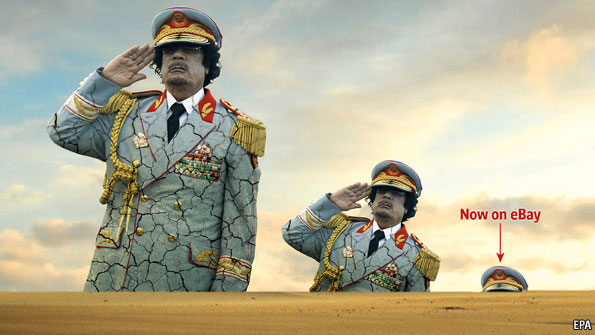
From the Economist: Libya will have an impact on NATO too. The military alliance that faced down the Red Army might have been expected to crush the clumsy forces of Colonel Qaddafi in days. Instead it took five months of fighting and 17,000 air sorties. An embarrassment for NATO? Not at all. The alliance has had a good war so far (who said “stalemate” not long ago?) and is winning the best kind of victory given the circumstances: one achieved mostly by Libyans themselves. Rebels entered the capital without a single Western soldier visible on the ground (though there were some special forces). NATO air attacks, as well as weapons supplied by friendly Gulf states, aided the rebels. But they alone manned trenches, which will give them added legitimacy in months to come.
War with restraint
The surprising length of the Libya campaign is a result of tactics employed on both sides. The colonel managed to hold out until now because he fights without restraint. This contrasts markedly with NATO. Its pilots have bombed selectively, keeping collateral damage to a minimum. Despite what pro-regime propagandists say, few civilians have been killed from the air. British and French generals, who led the campaign, rightly paid much attention to the interception of supplies to pro-Qaddafi forces, successfully weakening them over time.
Most important, NATO avoided “mission creep”, the dread of modern military forces. There is no sign so far that alliance ground troops will follow in the path of pilots as they did in Afghanistan, where a 2001 air campaign against the Taliban allowed a weak and divided opposition to take over, only later to need rescuing. Libya may still require peacekeepers but nobody is yet volunteering NATO for the task.
The moral and legal case for a limited intervention in Libya has not come undone as many critics predicted, though that may change if the country implodes under rebel control and the West is forced to deploy troops. In March, when pro-Qaddafi forces threatened to annihilate Benghazi, Western powers built a broad coalition to save it. Some squabbling inevitably followed, but Americans, north Europeans, Turks and Gulf Arabs did not fall out, as the colonel had hoped (and as they did over Iraq). Instead NATO developed a new—and desperately needed—modus operandi.
Libya is the first alliance campaign where America took a back seat. Europeans—with some shameful exceptions—carried most of the burden. This division of labour, in select circumstances, could be a template for future operations. But this does not mark the return of liberal interventionism. The bitter lessons of Kabul and Baghdad will be remembered far longer than any triumph in Tripoli. (graphic: EPA)
Image: epa%208%2030%2011%20Fall%20of%20Gaddafi.jpg
